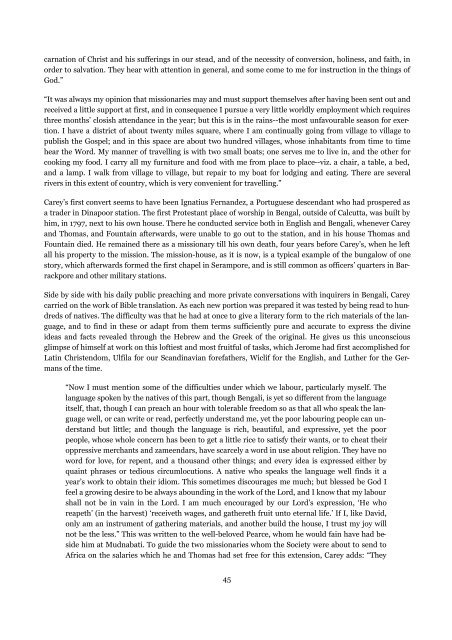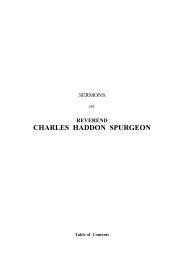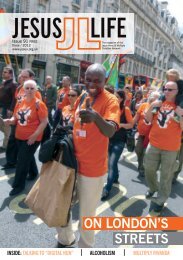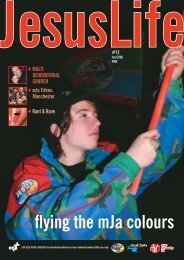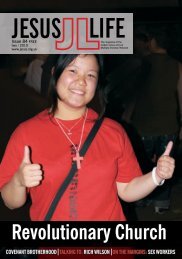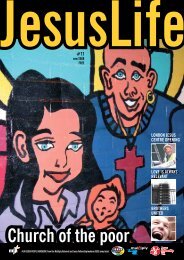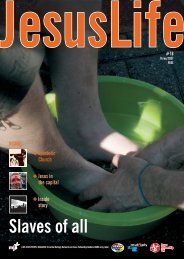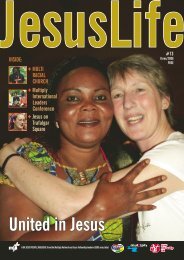Life of William Carey by George Smith - The Jesus Army
Life of William Carey by George Smith - The Jesus Army
Life of William Carey by George Smith - The Jesus Army
Create successful ePaper yourself
Turn your PDF publications into a flip-book with our unique Google optimized e-Paper software.
carnation <strong>of</strong> Christ and his sufferings in our stead, and <strong>of</strong> the necessity <strong>of</strong> conversion, holiness, and faith, in<br />
order to salvation. <strong>The</strong>y hear with attention in general, and some come to me for instruction in the things <strong>of</strong><br />
God.”<br />
“It was always my opinion that missionaries may and must support themselves after having been sent out and<br />
received a little support at first, and in consequence I pursue a very little worldly employment which requires<br />
three months’ closish attendance in the year; but this is in the rains--the most unfavourable season for exertion.<br />
I have a district <strong>of</strong> about twenty miles square, where I am continually going from village to village to<br />
publish the Gospel; and in this space are about two hundred villages, whose inhabitants from time to time<br />
hear the Word. My manner <strong>of</strong> travelling is with two small boats; one serves me to live in, and the other for<br />
cooking my food. I carry all my furniture and food with me from place to place--viz. a chair, a table, a bed,<br />
and a lamp. I walk from village to village, but repair to my boat for lodging and eating. <strong>The</strong>re are several<br />
rivers in this extent <strong>of</strong> country, which is very convenient for travelling.”<br />
<strong>Carey</strong>’s first convert seems to have been Ignatius Fernandez, a Portuguese descendant who had prospered as<br />
a trader in Dinapoor station. <strong>The</strong> first Protestant place <strong>of</strong> worship in Bengal, outside <strong>of</strong> Calcutta, was built <strong>by</strong><br />
him, in 1797, next to his own house. <strong>The</strong>re he conducted service both in English and Bengali, whenever <strong>Carey</strong><br />
and Thomas, and Fountain afterwards, were unable to go out to the station, and in his house Thomas and<br />
Fountain died. He remained there as a missionary till his own death, four years before <strong>Carey</strong>’s, when he left<br />
all his property to the mission. <strong>The</strong> mission-house, as it is now, is a typical example <strong>of</strong> the bungalow <strong>of</strong> one<br />
story, which afterwards formed the first chapel in Serampore, and is still common as <strong>of</strong>ficers’ quarters in Barrackpore<br />
and other military stations.<br />
Side <strong>by</strong> side with his daily public preaching and more private conversations with inquirers in Bengali, <strong>Carey</strong><br />
carried on the work <strong>of</strong> Bible translation. As each new portion was prepared it was tested <strong>by</strong> being read to hundreds<br />
<strong>of</strong> natives. <strong>The</strong> difficulty was that he had at once to give a literary form to the rich materials <strong>of</strong> the language,<br />
and to find in these or adapt from them terms sufficiently pure and accurate to express the divine<br />
ideas and facts revealed through the Hebrew and the Greek <strong>of</strong> the original. He gives us this unconscious<br />
glimpse <strong>of</strong> himself at work on this l<strong>of</strong>tiest and most fruitful <strong>of</strong> tasks, which Jerome had first accomplished for<br />
Latin Christendom, Ulfila for our Scandinavian forefathers, Wiclif for the English, and Luther for the Germans<br />
<strong>of</strong> the time.<br />
“Now I must mention some <strong>of</strong> the difficulties under which we labour, particularly myself. <strong>The</strong><br />
language spoken <strong>by</strong> the natives <strong>of</strong> this part, though Bengali, is yet so different from the language<br />
itself, that, though I can preach an hour with tolerable freedom so as that all who speak the language<br />
well, or can write or read, perfectly understand me, yet the poor labouring people can understand<br />
but little; and though the language is rich, beautiful, and expressive, yet the poor<br />
people, whose whole concern has been to get a little rice to satisfy their wants, or to cheat their<br />
oppressive merchants and zameendars, have scarcely a word in use about religion. <strong>The</strong>y have no<br />
word for love, for repent, and a thousand other things; and every idea is expressed either <strong>by</strong><br />
quaint phrases or tedious circumlocutions. A native who speaks the language well finds it a<br />
year’s work to obtain their idiom. This sometimes discourages me much; but blessed be God I<br />
feel a growing desire to be always abounding in the work <strong>of</strong> the Lord, and I know that my labour<br />
shall not be in vain in the Lord. I am much encouraged <strong>by</strong> our Lord’s expression, ‘He who<br />
reapeth’ (in the harvest) ‘receiveth wages, and gathereth fruit unto eternal life.’ If I, like David,<br />
only am an instrument <strong>of</strong> gathering materials, and another build the house, I trust my joy will<br />
not be the less.” This was written to the well-beloved Pearce, whom he would fain have had beside<br />
him at Mudnabati. To guide the two missionaries whom the Society were about to send to<br />
Africa on the salaries which he and Thomas had set free for this extension, <strong>Carey</strong> adds: “<strong>The</strong>y<br />
45


